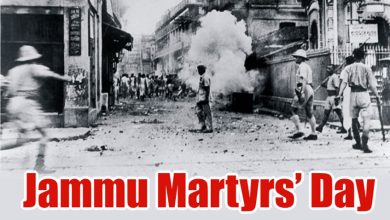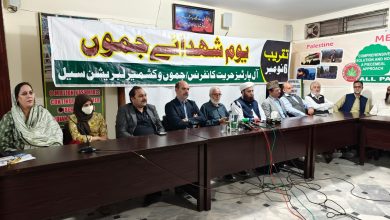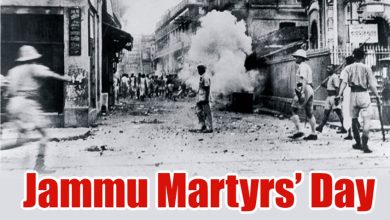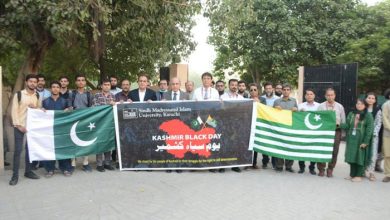Self-determination under foreign occupation hosted Pakistani mission to UN
Speakers link global peace to grant of birth right to occupied people
 United nations:: Speakers at an event marking the Kashmir Black Day called for allowing the oppressed peoples under foreign occupation to exercise their inalienable right to self-determination to usher in peace and stability in the world.
United nations:: Speakers at an event marking the Kashmir Black Day called for allowing the oppressed peoples under foreign occupation to exercise their inalienable right to self-determination to usher in peace and stability in the world.
According to Kashmir Media Service, the calls were made at a talk on the theme of “Right to self-determination of peoples under foreign occupation”, which was hosted by the Pakistani Mission to the United Nations at the Pakistan House.
Kashmir Black Day is commemorated annually on October 27 to mark the day in 1947 when India, without any legal justification, forcibly took control of the State of Jammu and Kashmir.
Participating in the event were students from the premier universities of New York, media persons as well as officers of the mission.
Ambassador Munir Akram, Pakistan’s Permanent Representative to the UN, and Prof. Abdelhamid Siyam, an academic and senior journalist, in their lectures explained the concept of self-determination in the context of Jammu and Kashmir and Palestine.
In his remarks, Ambassador Akram gave historical background to the different phases of the just and legitimate struggle of Kashmiris for their right to self-determination and paid tributes to their resilience, steadfastness and commitment in the face of Indian brutalities.
While the right to self-determination formed part of the UN Charter and has led to de-colonization after the World War II, he said this right has not been implemented in an equitable manner whereby people in Jammu and Kashmir and Palestine still continue to be held in bondage.
Ambassador Akram said that India, which brought the Kashmir dispute to the United Nations, has continue to occupy the disputed state by both fraud and force in contravention of the UN Security resolutions that are binding in nature.
This denial of rights only intensified the Kashmiri people’s struggle, especially following India’s unilateral and unlawful actions of August 5, 2019, that saw unprecedented lockdowns, systematic human rights violations, and severe restrictions on their freedom.
He reminded the audience that countless reports by international human rights organizations and independent observers have documented instances of excessive use of force, extra-judicial killing enforced disappearances, arbitrary detentions and collective punishment. He further said that the imposition of media blackouts, restrictions on freedom of expression, and curfews have sought to isolate the people of Kashmir from the world and curtail their ability to seek their right to self-determination.
Ambassador Akram called on the international community and the United Nations to hold those responsible for such violations accountable and to ensure that the voices of the Kashmiri people are heard. The UN, he said, was obligated to uphold its own resolutions and promote a just and peaceful settlement in line with the aspirations of the people of Jammu and Kashmir.
The Pakistani envoy said that sustainable peace in South Asia could not be established without providing the right to self-determination to Kashmiris, adding that reversal of actions of August 5 could be a starting point for the resumption of dialogue between India and Pakistan. He said that massive arms buildup by India and its touting of so-called Cold Start doctrine and a limited war under a nuclear hang were dangerous concepts having the potential to destabilize the region and the world at large.
On his part, Dr Abdelhamid Siyam discussed the Palestinian people’s right to self-determination, arguing that Palestinians, as the indigenous population of the land, were entitled to independence and self-determination in their ancestral homeland.
He traced Palestine’s political history, noting how Palestine had representation under Ottoman rule before British occupation in 1918. Following the 1939 British White Paper and the UN’s 1947 partition plan, the conflict intensified, culminating in the 1948 establishment of Israel and the displacement of over 800,000 Palestinians.
Professor Siyam cited UN and ICJ actions that uphold Palestinian self-determination, including a General Assembly resolution, affirming Palestinians’ rights to return, sovereignty, and statehood. He highlighted global support, including near-unanimous votes at the UN affirming Palestine’s rights, despite Israel and a few of its allies’ opposition.
He condemned Israeli policies, including the 2018 National Identity Law, as apartheid-like measures, expressing confidence in a future where Palestinians would attain full self-determination and freedom.
The speeches were followed by an interactive dialogue in which students asked several questions seeking elaboration on different aspects of the right to self-determination, the role of the UN and the future of India-Pakistan relations.








